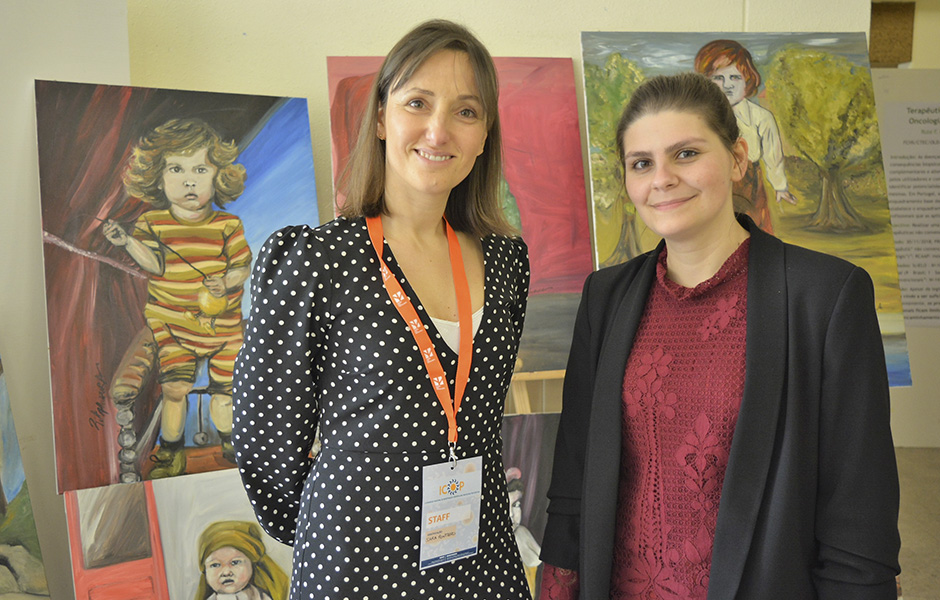Near 130 health professionals from all over the country, especially psychologists, nurses and doctors, as well as students, gathered at the I National Congress of Scientific Research on Psychosocial Oncology (ICOP), which took place from March 14 to 15, at the University of Aveiro with the support of Cintesis – Center for Health Technology and Services Research.
The aim of this first edition was to discuss the needs of cancer patients, especially with regard to interventions to treat psychological distress.
Sara Monteiro, Ana Bártolo (photo) and Isabel Santos are the CINTESIS / University of Aveiro researchers members of the Organizing Committee of this Congress, whose program included conferences, symposia and free oral and written communications on topics such as breast cancer, multiple myeloma and Pediatric Oncology.
“We decided to organized this Congress because we have developed research in Psycho-Oncology at different stages of oncological disease, particularly in cancer survivors, and we realize that it is necessary to approach Psychosocial Oncology in multidisciplinary teams, without losing sight of the holistic approach to these patients,” explained Ana Bártolo, in the context of this first edition.
Sara Monteiro, who has been researching for several years in this area, highlighted the importance of researching to understand the specificities of each oncological disease, such as the age, perception and need felt by each patient, family member, caregiver and professional, to adapt the response delivered.
“Each oncological pathway requires different responses from the point of view of care. Often, health professionals, doctors and nurses are not so sensitive to some issues that may arise along the course of the disease, such as psychological or psychosocial issues. It is necessary to draw attention to these issues, highlight their importance, train and inform professionals so that these issues can be addressed in consultation,” she said.
The CINTESIS researcher and Guest Assistant Professor at the University of Aveiro emphasized that in addition to promoting mental health, the care provided in Psychosocial Oncology has scientifically proven results in clinical terms.
“In principle, a person who is well-adjusted psychologically will more readily adhere to the therapeutic process and will go through the illness in a less painful way. Fortunately, many people are able to adapt well to this menacing disease, but it is important that we try to ensure the mental health of all cancer patients,” she said.
In expectation that research can influence action, she hopes that this type of care will be extended to all hospitals and the entire country. “The concern is growing, but still insufficient. The patient has to be regarded as a whole and not just as someone who has a cancer that needs to be treated,” she advised.
According to Luzia Travado, a researcher at the Champalimaud Foundation and the past president of the International Psycho-Oncology Society (IPOS), which represents 7,000 professionals in 67 countries, “cancer is currently the second leading cause of death. One in three men and one in four women will be affected by the disease throughout their lifetime. The good news is that the prognosis has improved, with an increase in patient survival.”
In Portugal, she continued, “there will be 155.000 people living with the disease or survivors and every year there are about 60.000 cases. Of these, about one-third will need care.”
According to the specialist, who spoke after the opening session, “Psycho-Oncology care is a patient’s right and cannot be neglected, otherwise there will be a negative impact on clinical outcomes, especially survival and quality of life”.
According to Luzia Travado, who was part of the first multidisciplinary team of breast cancer treatment in our country and trained health professionals at a national level, “psychological suffering must be measured as the sixth vital sign so that it no longer passes unnoticed or ignored. Today there is a wealth of effective interventions in reducing suffering and psychological morbidity that are inexpensive for the system and should be part of quality oncology care.”
The researchers hope to raise awareness of civil society, which is fundamental to “elucidate politicians to the existing gaps”.
The CINTESIS team at the University of Aveiro includes several projects in the area of Psychosocial Oncology, namely projects related to reproductive concerns, cognitive functioning and the capacity to work of cancer survivors.

